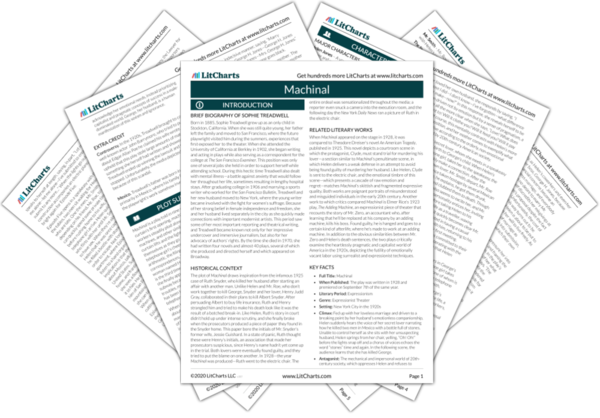Marriage and Gender Inequality
Machinal was written for the stage in the early 20th century, a time when patriarchal norms dictated the dynamics of romantic relationships. In this male-focused environment, women were expected to defer to their husbands, sacrificing their own individuality and agency in order to maintain respectable marriages. These sexist expectations often manifest themselves throughout Machinal in terms of financial stability, as Helen’s coworkers and even her mother urge her to wed her boss, George H.…
read analysis of Marriage and Gender InequalityCommunication
The characters in Machinal often fail to effectively relate to one another using language. Instead of communicating clearly and listening to what other people have to say, they hold forth with their own monologues and ideas, showing themselves incapable of engaging in the give-and-take of successful conversation. Under these fraught circumstances, Helen finds herself hopelessly estranged from her husband, who never opens himself up to the possibility that their marriage has made her utterly miserable—instead…
read analysis of CommunicationThe Mechanical World
Machinal is a play inundated by machines. The constant presence of mechanical sounds and industrialized landscapes shapes Helen’s life into an existence ruled by isolation, monotony, and anxiety. In a note titled “The Plan,” Treadwell comments on the nature of the play, explaining Helen’s relationship to the external world: “The woman is essentially soft, tender, and the life around her is essentially hard, mechanized. Business, home, marriage, having a child, seeking pleasure—all are difficult…
read analysis of The Mechanical World
Fragmentation and Expressionism
Machinal is an example of Expressionist theater, a style of performance that aligns itself with the modernist artistic concept of Expressionism, which sought to represent not tangible, external reality, but rather the inner and subjective world of emotions and personal experience. In keeping with this, Treadwell imbues her scenes with disorder and chaos, qualities often invoked by the use of everyday sounds, needless repetitions of speech, and exaggerated linguistic clichés. In fact, she takes these…
read analysis of Fragmentation and Expressionism






